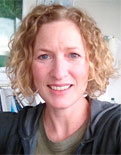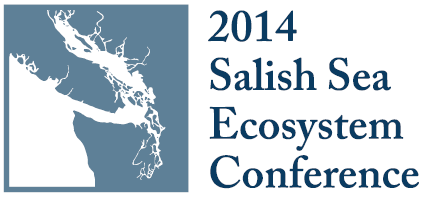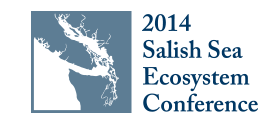At one point, dams and habitat destruction had all but wiped out several species of salmon across the Pacific Northwest. But even as billions of dollars in restoration efforts have started to make an impact, scientists in the Salish Sea are noticing a new problem: just offshore, young salmon are dying in large numbers.
Blog
Browse recent blog posts below.
Displaying 41 - 60 of 95Wade out into the shallows of Puget Sound on a warm, sunny day and put your ear close to the water. You might catch the faint, champagne-like bubbling of eelgrass. Take a listen to an underwater recording made at the Padilla Bay National Estuarine Research Reserve. A hydrophone captures the sound of oxygen bubbling from eelgrass leaves as the plant absorbs and photosynthesizes the sun's rays.
Historically, the waters from the Strait of Georgia to Puget Sound hosted roughly 70% of the world's western grebe population. Now biologists estimate that only 4% of the birds continue to winter here—a decline of 95%. Why did all the grebes leave? Where did they go? And what does their disappearance say about the health of the Salish Sea?
A lot of great stories are coming in for our Salish Sea writers series. Last month we sent 11 writers to the Salish Sea Ecosystem Conference to report on some of the key takeaways from the event. Look for a series of articles in these pages starting in July. Stories will range from the "salmon survival bottleneck"—why are so many of Puget Sound's salmon dying young?—to the state of the region's marine birds, new eelgrass targets and many others.
We'll be posting the latest news about the Salish Sea Ecosystem Conference at the Puget Sound Institute's SSEC14 blog. Visit the site to read about the new conference mobile app, our science writers project and many other happenings this week and next as the conference goes into full swing.![]()
The Encyclopedia of Puget Sound has been chosen to publish the official mobile app for the upcoming Salish Sea Ecosystem Conference in Seattle. The app will allow users to customize their schedules, network with conference participants and receive real-time news about conference events. It will be available for all devices and will be the first time a mobile app has been developed specifically for the biennial conference.
EoPS Social and Economic Sciences topic editor Patrick Christie will lead a collaborative study of the management and "social ecological resilience" of Marine Protected Areas in Puget Sound.
Each year, state and federal agencies put more than a hundred million dollars toward the protection and restoration of Puget Sound. All of these efforts are informed in some fashion by science. It's a simple equation: what we know about the ecosystem ultimately determines how we take care of it.
The Puget Sound Leadership Council has appointed four new members to the Puget Sound Science Panel, including two Canadian scientists. Ian Perry of Fisheries and Oceans Canada, and Terre Satterfield of the University of British Columbia join Nives Dolsak and Tim Essington of the University of Washington. Puget Sound Institute Visiting Scientist Bill Labiosa (USGS) was re-appointed.
 We are pleased to announce that Dr. Tessa Francis has joined the Encyclopedia of Puget Sound editorial board. Tessa is the Lead Ecosystem Ecologist at the University of Washington Tacoma’s Puget Sound Institute, and will serve as the Encyclopedia's ecosystem-based management topic editor. She is an aquatic ecologist, and her research is related to aquatic food webs, and the impacts of environmental change on food-web dynamics.
We are pleased to announce that Dr. Tessa Francis has joined the Encyclopedia of Puget Sound editorial board. Tessa is the Lead Ecosystem Ecologist at the University of Washington Tacoma’s Puget Sound Institute, and will serve as the Encyclopedia's ecosystem-based management topic editor. She is an aquatic ecologist, and her research is related to aquatic food webs, and the impacts of environmental change on food-web dynamics.
When we first started this project, we felt that if we were to truly consider ourselves an encyclopedia, we needed to be encyclopedic. We needed to strive, at least, for some sort of comprehensive accounting of Puget Sound and the Salish Sea ecosystem. We began by collecting and developing lists of species known to occur in the region, and you can find many of these in our species library.
As go forage fish, so may go the health of Puget Sound. That’s the conclusion of scientists who say small schooling fish like Pacific herring, surf smelt and Pacific sand lance play a big role in the marine food web.
Oily and full of calories, these fish are an important source of food for familiar predators like salmon, sea birds and marine mammals. But the region’s forage fish may be vulnerable on a variety of fronts, according to an expert panel of scientists who met at Friday Harbor Labs for a five-day workshop last month.
A Puget Sound Institute-sponsored study panel on the ecosystem-based management of forage fish is underway this week at Friday Harbor Labs. Forage fish populations are considered a key indicator of the health of the Salish Sea, and these expert panels are examining research questions related to status and trends, vulnerabilities and spatial variation of species.
The environmental effects of sea level rise due to climate change are just starting to become clear. So far, much of the conversation has focused on population displacement and changes to natural features and processes. Scientists project, for example, that within the next century, many fragile coastal meadows and wetlands will succumb to salt water, and a rising Puget Sound will reduce spawning grounds for forage fish. Shoreline habitat will be altered for species across the board.
Species and their habitats are a foundation of the ecosystem framework, but there is currently no generally agreed upon habitat classification system for Puget Sound. The closest thing for its marine and estuarine waters may be Dr. Megan Dethier's 1990 resource A marine and estuarine habitat classification system for Washington State. Much of the work for that document was done in the general vicinity of Puget Sound, and it has been an influential resource for major habitat mapping efforts in the region, such as Shorezone.
The 2013 Health of the Salish Sea Ecosystem Report from EPA and Environment Canada is now available. The report builds upon ongoing ecosystem indicator work in Puget Sound, while extending the range and scope to include the entire Salish Sea.
- ‹ previous
- 3 of 5
- next ›
PSI eNews Archives

This Encyclopedia's parent organization, the Puget Sound Institute, also publishes an email newsletter. Visit the PSI blog to subscribe to the PSI eNews or peruse past issues.











